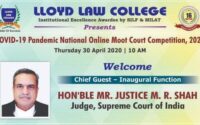Litigation: Role and Responsibilities of Litigation
This Article is written by Ishita Agrawal from Mody University of Science and Technology
Introduction
Litigation lawyers, otherwise called litigators or trial lawyers, address plaintiff parties and defendants in civil lawsuits. They deal with all periods of the litigation from the examination, pleadings, and discovery through the pre-trial, trial, settlement, and appeal process.
Undertakings can differ depending on the idea of the debate, the experience of the lawyer, and whether he’s addressing the plaintiff party or the defendant.
What is the Role of a Litigation Lawyer?
Civil Litigation is a cycle of settling debates between parties. By and large, parties utilize the court cycle to authorize, practice or protect a legitimate right. A case attorney or litigator can address either the candidate (plaintiff party) or the respondent (defendant) in the matter.
As legal advisors, our first obligation is to the court. Our job is to advocate to the greatest advantage of the customer, however without deluding the court. It is a typical misinterpretation that legal advisors go through the majority of their day (and the case) battling for their customer’s privileges in a court. In truth, most case matters are managed and settled without the need to show up under the watchful eye of an appointed authority.
What qualifications do you need to be a Litigation Lawyer?
A prosecution legal advisor (litigation lawyer) is a legal counselor (lawyer) who rehearses in the area of litigation. Thus, the capabilities needed to be a suit legal advisor is equivalent to that to be a legal counselor. To be qualified to rehearse as a legal counselor, one must:
have finished a law degree from a perceived college.
have finished an authorized functional lawful instructional class.
be officially conceded to rehearse in their particular state.
hold a current rehearsing authentication.
It is an offense to hold yourself out as a legal advisor without finishing the above.
Duties and Responsibilities of a Litigation Attorney
The suit lawyer assists you with every one of the cycles relating to civil lawsuits. A portion of the errands a suit lawyer may assist you with include:
Initial case assessment and investigation
For the most part, before continuing with any matter, a legal advisor would start a fundamental examination of the case. The motivation behind this underlying case appraisal is to comprehend and gather data to build up the issues in debate and the results looked for by the customer. After an examination of all accessible data, the legal counselor ought to furnish their customer with an exhortation regarding their possibilities of accomplishment and alternatives pushing ahead (assuming any). In this exhortation, the prosecution legal counselor (litigation lawyer) may demand their customer’s further directions or records to confirm their underlying position.
Drafting Pleadings
Before a matter is heard in court, there are a progression of movements and pleadings that should be enlisted with the court for the plaintiff party and the defendant also.
Here, a plaintiff party lawyer will draft summons and protests to start the suit interaction.
Then again, defense lawyers will at that point draft a response and on occasion a counterclaim to the defendants grumbling.
A defense lawyer will at that point work with the customer to investigate the claims and figure reactions.
Beside these filings, trial lawyers can likewise draft pre-trial movements. These incorporate movements to change the area of the trial or to strike and excuse proof.
Additionally, they can record movements on decisions dependent on the pleadings without fundamentally showing up in court.
The Discovery Process
The discovery segment of a lawsuit includes the trading of all applicable data between the gatherings (parties). Suit lawyers utilize an assortment of revelation gadgets to acquire this data.
These strategies can incorporate interrogatories, a progression of composed inquiries that the other party to the lawsuit should reply to likewise recorded as a hard copy and under punishment of prevarication. It can incorporate statements which include oral inquiries commonly introduced by the other lawyer in an office setting, again replied after swearing to tell the truth.
Other basic techniques for discovery incorporate solicitations for reports that are in the ownership of the other party just as solicitations for confirmation requesting that the other party concede to or deny certain parts of the case recorded as a hard copy and having sworn to tell the truth.
Litigation lawyers may likewise inspect actual proof and gather, measure, and break down data accumulated during e-discovery. Regularly, in any case, they depend on specialists to offer these types of assistance. The specialists submit composed reports that would then be able to be utilized at preliminary or they may be called to affirm at preliminary.
Litigation lawyers likewise draft and contend discovery related movements including movements to force the opposite side to react to discovery demands in the event that they haven’t done as such inside a predefined time-frame.
These discovery measures help litigators acquire applicable data, distinguish issues, and figure a case procedure.
Pre-Trial Tasks
When a lawsuit has been documented and acknowledged, the case lawyer should wrap up the discovery stage and direct some pre-preliminary exercises to get ready for appearance in court.
These exercises incorporate social affair the names of expected observers, masterminding and directing affidavits by specialists, talking with key observers, looking at proof that will be utilized as displays in court, planning proof to be utilized in court, concocting preliminary procedures relying upon the accessible proof and realities, going to pre-preliminary meetings, and drafting and contending pre-preliminary motions.
Trial: Almost the Final Stage
At the point when cases continue to preliminary, litigation lawyers are occupied non stop communicating their viewpoint under the steady gaze of the appointed authority or planning for the following day in court.
Litigators work together with specialists and customers to create a preliminary topic. They distinguish the qualities and shortcomings of a case and foster convincing contentions.
An interaction called voir dire starts a preliminary. It is the way toward choosing a jury. Litigators at that point put forth their perspectives in court, giving opening and shutting statements to the adjudicator or jury, inspecting and interrogating observers, and making their variant of the case through declaration and proof. Case lawyers may likewise lead post-preliminary meetings of the jury.
Settlement
In some cases, cases don’t get to the preliminary stage. All things being equal, the two parties concoct a method of resolving the dispute out of court to get rid of the cost and hazard of going to court.
A litigation attorney can help you settle a case without the need to go to preliminary. To do this, the litigation lawyer will haggle with different parties and attempt to go to a sensible settlement.
Once in a while, the litigation lawyer may even have to take part in mediation and settlement conferences with the Judge (adjudicator) responsible for the case.
When an understanding has been reached, it will be the obligation of the litigation lawyer to make arrangements and deliver the dependent on the arrangement. As a rule, it is smarter to settle as opposed to going to the preliminary.
The Appeal Process
A lawyer may advance the case for her client if the preliminary goes gravely, however he can’t do so just on the grounds that she doesn’t care for the result. She should introduce proof with respect to why the preliminary court’s choice wasn’t right somehow or another dependent on issues, for example, certain proof being conceded at preliminary when it ought not have been.
Litigators may draft post-preliminary movements, distinguish and preserve issues for appeal (request), develop appellate techniques, accumulate proof for the appellate record, research procedural issues, draft appellate documents, and present oral contentions (arguments) under the watchful eye of appellate courts.
In the event that the case is especially critical or complex, litigators may hold the help of lawyers who have some expertise in investigative practice.
Conclusion
It is clear that the lawful interaction can be very mind boggling for somebody who is self-addressing, in this way making it important to have a litigation lawyer assist you with the cycle.
Litigation lawyers will assist you with different parts of a claim, including beginning of the case, appraisal and examination, document preparation, drafting pleadings, discovery, pre-preliminary assignments, portrayal in preliminary, settlement and appeal.
Working with a litigation lawyer has various advantages, including giving your true serenity, assisting you with saving expenses, limiting your danger, abstaining from incriminating yourself, exploring the court cycle effectively, better insight and better handling of the case.
Curated by Athira Albert of Kristu Jayanti College of Law, Bangalore.


